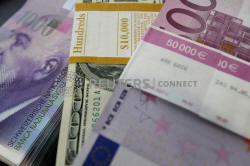U.S. calls Switzerland, Vietnam currency manipulators in Trump trade
shot
 Send a link to a friend
Send a link to a friend
 [December 17, 2020] By
David Lawder [December 17, 2020] By
David Lawder
WASHINGTON (Reuters) - The Trump
administration labeled Switzerland and Vietnam currency manipulators on
Wednesday, in another parting shot at trading partners that could
complicate matters for U.S. President-elect Joe Biden's incoming team.
In a long-overdue report, the U.S. Treasury also added India, Thailand
and Taiwan to a list of trading partners it says may be deliberately
devaluing their currencies against the dollar.
The COVID-19 pandemic has skewed trade flows and widened U.S. deficits
with trading partners, an irritant to outgoing President Donald Trump,
who won office four years ago partly on a promise to close the U.S.
trade gap.
The Swiss National Bank said it does not manipulate its currency and
"remains willing to intervene more strongly in the foreign exchange
market".
Vietnam's central bank said it would work with U.S. authorities to
ensure a "harmonious and fair" trade relationship.

"Vietnam's foreign exchange rate policy has for years been managed in a
way to contain inflation, ensure macro stability and not to create
unfair trade advantage," the State Bank of Vietnam said in a statement.
The manipulator labels will ramp up pressure on Biden before he takes
over, Per Hammered, chief emerging markets strategist at SEB in
Stockholm, said.
"You set the agenda and force him (Biden) into positions that he will
have to get out of somehow," Hammered said.
A U.S. Treasury official said Biden's transition team had not been
briefed, adding: "They are not implicated in this."
U.S. Treasury Secretary nominee Janet Yellen could alter the findings in
her first currency report, which is due in April.
A spokesman for Biden's team did not respond to a request for comment.
The President-elect's team has been critical of other moves by U.S.
Treasury Secretary Steven Mnuchin, including ending some Federal Reserve
pandemic lending programs.
Mnuchin said in a statement that the Treasury "has taken a strong step
today to safeguard economic growth and opportunity for American workers
and businesses."
China, labeled by Mnuchin as a currency manipulator in August 2019 at
the height of trade tensions, was kept on the Treasury's monitoring list
due to its high trade surplus with the United States.
Mnuchin lifted the designation in January, two days before the world's
two largest economies signed a "Phase 1" trade deal.

TRADE ADVANTAGE
Countries must at least have a $20 billion-plus bilateral trade surplus
with the United States, foreign currency intervention exceeding 2% of
gross domestic product and a global current account surplus exceeding 2%
of GDP to be labeled a manipulator.
Vietnam and Switzerland far exceeded these criteria, with foreign
exchange interventions of 5% and 14% of GDP respectively. (See FACTBOX)
The report said that at least part of Vietnam's intervention was aimed
at pushing down the dong for a trade advantage, while at least part of
Switzerland's action was aimed at pushing down the Swiss franc to
prevent effective balance of payments adjustments.
[to top of second column] |

Stacks of Swiss franc, Euro and U.S. dollar banknotes are displayed
in a bank in Bern August 15, 2011. REUTERS/Pascal Lauener/File Photo

Mark Sobel, a former Treasury and International Monetary Fund (IMF) official,
said the manipulator designations were "mechanistic" interpretations of the
thresholds that ignored subtleties and extenuating circumstances.
These include safe-haven inflows into Switzerland's currency due to the pandemic
and a rush of foreign investment into Vietnam in 2019, fueled by U.S. tariffs on
Chinese goods.
The IMF has forecast that Vietnam's current account surplus will fall below the
2% of GDP threshold for 2020.
"They're missing some more obvious cases of harmful currency practices," said
Sobel, adding that Taiwan and Thailand, which narrowly missed the intervention
thresholds, "have been intervening heavily for years."
The Treasury official said the United States will seek negotiations with
Switzerland and Vietnam to bring them back below the manipulation thresholds and
declined to speculate on whether the process could lead to U.S. tariffs on their
goods.
Among remedies specified in U.S. laws governing the currency report are limiting
offending countries' access to government procurement contracts and to
development finance.
Vietnam could be hit with tariffs under a separate probe by the U.S. Trade
Representative's office into the causes of an undervalued dong that could be
influenced by the Treasury report. Some business leaders fear Trump could act
before a late December hearing on the issue, but a source familiar with the
matter said that appeared unlikely.
Taiwan said its currency policies were aimed at stability and that it hopes to
cut its trade surplus with the United States to address U.S. concerns.

Thailand said its addition to the monitoring list would have no big impact.
The label briefly lifted the value of the Swiss franc against a broadly soft
dollar.
Forex strategists said the move may make it slightly more difficult for the SNB
to intervene, but the easing of the coronavirus pandemic would reduce upward
pressure on the franc.
The Thai baht leapt to a seven-year peak as investors reckoned Thailand's
central bank might ease off its baht selling. The dong inched up to a two-week
high and the Taiwan dollar made a new 23-year peak. [EMRG/FRX]
The additions of India, Thailand and Taiwan leave the Treasury monitoring list
at 10, with China, Japan, South Korea, German, Italy, Singapore and Malaysia
already on it. Vietnam and Switzerland were upgraded and Ireland was removed.
The report said that India and Singapore had intervened in the foreign exchange
market in an "asymmetric manner" but did not meet other requirements to warrant
a manipulator label.
(Reporting by David Lawder; Additional reporting by Andrea Shalal in Washington,
Dan Burns in New York, John Revill in Zurich, Saikat Chatterjee in London, Khanh
Vu and James Pearson in Hanoi and Shriya Ramakrishnan in Bengaluru; Editing by
Sam Holmes, Stephen Coates and Richard Pullin)
[© 2020 Thomson Reuters. All rights
reserved.] Copyright 2020 Reuters. All rights reserved. This material may not be published,
broadcast, rewritten or redistributed.
Thompson Reuters is solely responsible for this content. |